外研版(2019)选择性必修第二册Unit4 Breaking boundaries Using language 课件(共15张PPT,内嵌音频)
文档属性
| 名称 | 外研版(2019)选择性必修第二册Unit4 Breaking boundaries Using language 课件(共15张PPT,内嵌音频) |

|
|
| 格式 | pptx | ||
| 文件大小 | 8.1MB | ||
| 资源类型 | 教案 | ||
| 版本资源 | 外研版(2019) | ||
| 科目 | 英语 | ||
| 更新时间 | 2024-07-15 11:48:13 | ||
图片预览

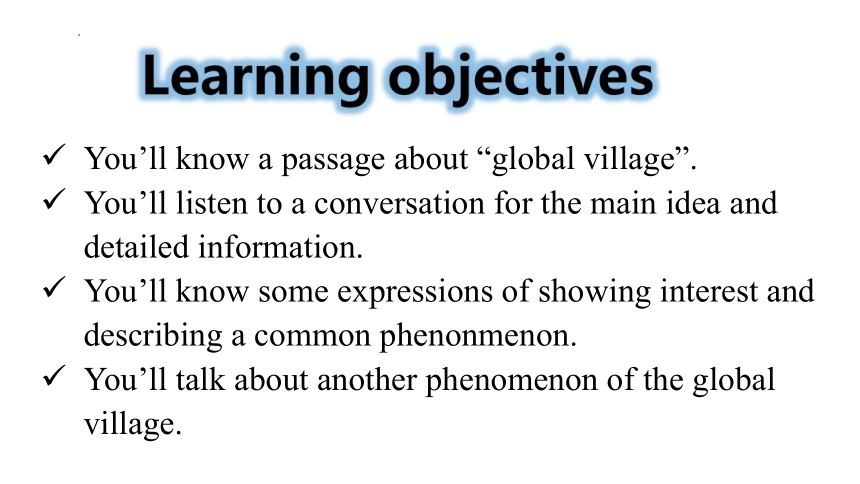
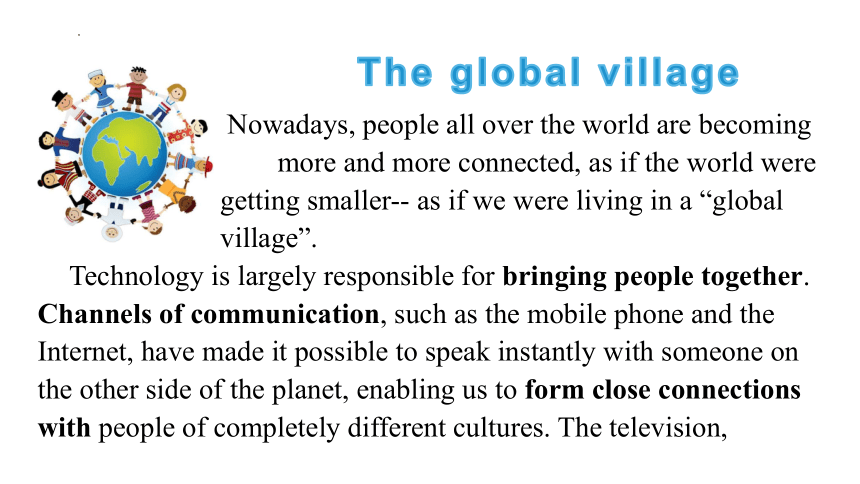
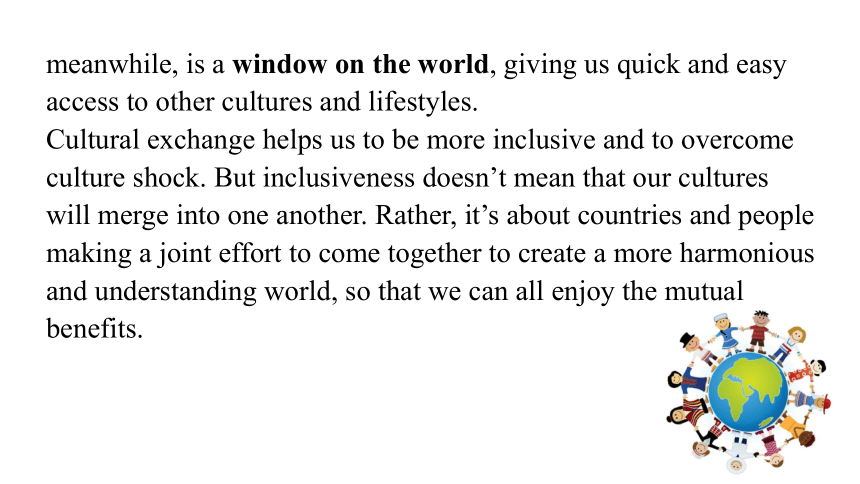
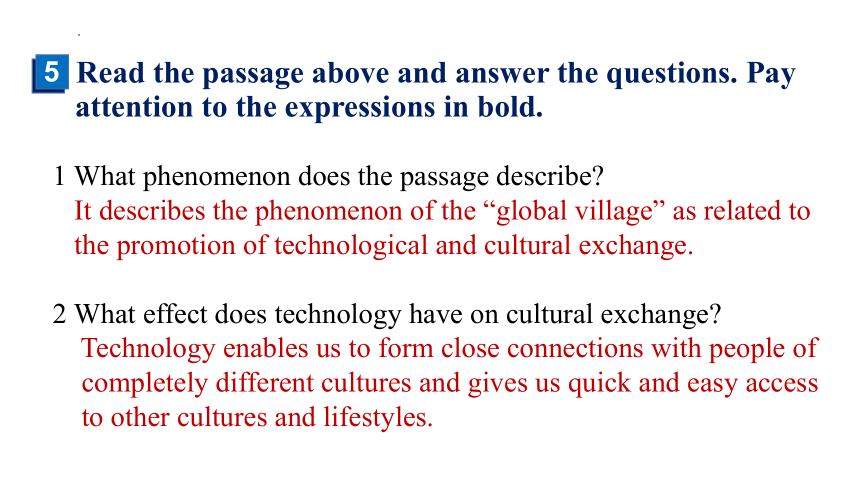
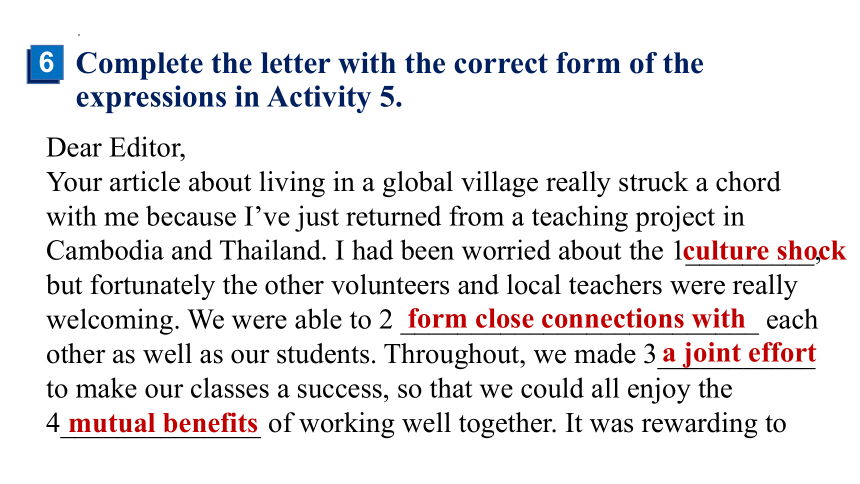
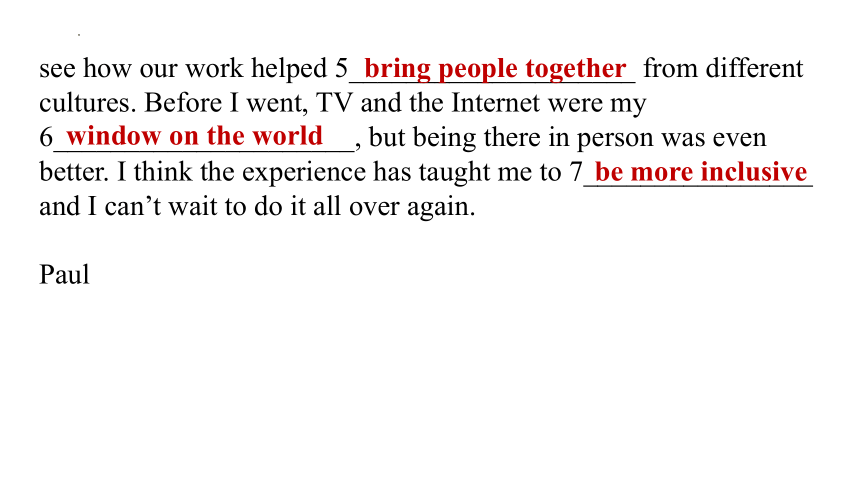
文档简介
(共15张PPT)
新外研版选择性必修Book 2
Unit 4 Breaking boundaries
Using languageⅡ P42-43
Learning objectives
You’ll know a passage about “global village”.
You’ll listen to a conversation for the main idea and detailed information.
You’ll know some expressions of showing interest and describing a common phenonmenon.
You’ll talk about another phenomenon of the global village.
The global village
Nowadays, people all over the world are becoming
more and more connected, as if the world were
getting smaller-- as if we were living in a “global
village”.
Technology is largely responsible for bringing people together. Channels of communication, such as the mobile phone and the Internet, have made it possible to speak instantly with someone on the other side of the planet, enabling us to form close connections with people of completely different cultures. The television,
meanwhile, is a window on the world, giving us quick and easy access to other cultures and lifestyles.
Cultural exchange helps us to be more inclusive and to overcome culture shock. But inclusiveness doesn’t mean that our cultures
will merge into one another. Rather, it’s about countries and people
making a joint effort to come together to create a more harmonious and understanding world, so that we can all enjoy the mutual benefits.
5
Read the passage above and answer the questions. Pay
attention to the expressions in bold.
1 What phenomenon does the passage describe
It describes the phenomenon of the “global village” as related to
the promotion of technological and cultural exchange.
2 What effect does technology have on cultural exchange
Technology enables us to form close connections with people of
completely different cultures and gives us quick and easy access
to other cultures and lifestyles.
Complete the letter with the correct form of the expressions in Activity 5.
6
Dear Editor,
Your article about living in a global village really struck a chord with me because I’ve just returned from a teaching project in Cambodia and Thailand. I had been worried about the 1_________, but fortunately the other volunteers and local teachers were really
welcoming. We were able to 2 _________________________ each other as well as our students. Throughout, we made 3___________ to make our classes a success, so that we could all enjoy the 4______________ of working well together. It was rewarding to
culture shock
form close connections with
a joint effort
mutual benefits
see how our work helped 5____________________ from different cultures. Before I went, TV and the Internet were my 6_____________________, but being there in person was even better. I think the experience has taught me to 7________________ and I can’t wait to do it all over again.
Paul
bring people together
window on the world
be more inclusive
Listen to the conversation and choose the main idea.
7
1 More and more foreign words and expressions are entering
the English language, especially those about food.
2 Chinese food is popular in the UK, and many Chinese words
and expressions are entering English dictionaries as a result.
3 Intercultural communication is increasing, and people all over
the world have a better understanding of each other.
4 World sports are bringing people together in the same way
that food is.
Listen again and complete the table.
8
regional words are making it
wonton
the food we buy and eat
all kinds of food
a lot of choices
Italian, French and Japanese restaurants
use chopsticks
connecting people
people in Britain eating Chinese food
pizza while watching the same game
Now talk about more examples of each phenomenon.
Katie: Hey Robbie, I constantly come across new words in online newspapers. Do
you know what this word means “Grockle”.
Robbie: [looking and laughing] Oh, it’s a word used in Devon. It refers to a tourist.
Katie: Really No wonder I haven’t heard it before. We in Liverpool never use it. I
wonder if it’s in the dictionary. Let me look up the dictionary on my mobile
phone. [sound of pressing buttons on mobile phone] Yes, here it is! I guess
more and mote regional words are making it into dictionaries these days.
Robbie: That’s interesting. And I suppose you have the variations of English from
around the world to think about, too.
Katie: Yes. Did you know that “wok” is a Cantonese word, for example It’s a
particular type of pan.
Robbie: Is it really I only knew that words like chow mein, wonton and chop suey
are all from Chinese.
听力原文:
Showing interest
Katie: In fact, there are more and more Chinese words and expressions making
their way into English.
Robbie: Right. Especially with more and more people learning Chinese. It is really
amazing how much English has changed over the last few decades.
Katie: I agree. And actually, the changes don’t just happen to the words we use, but
also the food we now find in shops and restaurants. For example, I often go
shopping in a large Asian supermarket not far from where I live. There are
all kinds of foods from Asia, like bamboo shoots and durian fruit.
Robbie: Really When I eat out with my friends, we often go to a Chinese
restaurant, although there are lots of other restaurants to choose from,
such as Italian, French and Japanese. I also find it interesting to see just
how many Europeans know how to use chopsticks.
Katie: Indeed. Nowadays, you don’t need to go abroad to enjoy food from other
parts of the world. No wonder it isn’t a surprise to see people in Britain
Describing a common phenomenon.
eating Chinese food while watching the UEFA Champions League live.
And it is not unusual to find, on the other side of the world, people
enjoying pizza while watching the same game.
Robbie: The world is getting smaller and smaller. As is often said, we’re living in
a global village.
Describing a common phenomenon.
Complete the boxes with the expressions from the
conversation.
9
Really
That’s interesting.
Is it really
It is really amazing…
I also find it interesting to see …
No wonder it isn’t a surprise to see…
It is not unusual to find…
Showing
interest
Describing a common phenomenon.
Work in pairs.
Talk about another phenomenon of the global village
using the expressions in this section.
Now think about any difficulties you encountered during
your discussion and what you did to overcome them.
10
Thank you!
新外研版选择性必修Book 2
Unit 4 Breaking boundaries
Using languageⅡ P42-43
Learning objectives
You’ll know a passage about “global village”.
You’ll listen to a conversation for the main idea and detailed information.
You’ll know some expressions of showing interest and describing a common phenonmenon.
You’ll talk about another phenomenon of the global village.
The global village
Nowadays, people all over the world are becoming
more and more connected, as if the world were
getting smaller-- as if we were living in a “global
village”.
Technology is largely responsible for bringing people together. Channels of communication, such as the mobile phone and the Internet, have made it possible to speak instantly with someone on the other side of the planet, enabling us to form close connections with people of completely different cultures. The television,
meanwhile, is a window on the world, giving us quick and easy access to other cultures and lifestyles.
Cultural exchange helps us to be more inclusive and to overcome culture shock. But inclusiveness doesn’t mean that our cultures
will merge into one another. Rather, it’s about countries and people
making a joint effort to come together to create a more harmonious and understanding world, so that we can all enjoy the mutual benefits.
5
Read the passage above and answer the questions. Pay
attention to the expressions in bold.
1 What phenomenon does the passage describe
It describes the phenomenon of the “global village” as related to
the promotion of technological and cultural exchange.
2 What effect does technology have on cultural exchange
Technology enables us to form close connections with people of
completely different cultures and gives us quick and easy access
to other cultures and lifestyles.
Complete the letter with the correct form of the expressions in Activity 5.
6
Dear Editor,
Your article about living in a global village really struck a chord with me because I’ve just returned from a teaching project in Cambodia and Thailand. I had been worried about the 1_________, but fortunately the other volunteers and local teachers were really
welcoming. We were able to 2 _________________________ each other as well as our students. Throughout, we made 3___________ to make our classes a success, so that we could all enjoy the 4______________ of working well together. It was rewarding to
culture shock
form close connections with
a joint effort
mutual benefits
see how our work helped 5____________________ from different cultures. Before I went, TV and the Internet were my 6_____________________, but being there in person was even better. I think the experience has taught me to 7________________ and I can’t wait to do it all over again.
Paul
bring people together
window on the world
be more inclusive
Listen to the conversation and choose the main idea.
7
1 More and more foreign words and expressions are entering
the English language, especially those about food.
2 Chinese food is popular in the UK, and many Chinese words
and expressions are entering English dictionaries as a result.
3 Intercultural communication is increasing, and people all over
the world have a better understanding of each other.
4 World sports are bringing people together in the same way
that food is.
Listen again and complete the table.
8
regional words are making it
wonton
the food we buy and eat
all kinds of food
a lot of choices
Italian, French and Japanese restaurants
use chopsticks
connecting people
people in Britain eating Chinese food
pizza while watching the same game
Now talk about more examples of each phenomenon.
Katie: Hey Robbie, I constantly come across new words in online newspapers. Do
you know what this word means “Grockle”.
Robbie: [looking and laughing] Oh, it’s a word used in Devon. It refers to a tourist.
Katie: Really No wonder I haven’t heard it before. We in Liverpool never use it. I
wonder if it’s in the dictionary. Let me look up the dictionary on my mobile
phone. [sound of pressing buttons on mobile phone] Yes, here it is! I guess
more and mote regional words are making it into dictionaries these days.
Robbie: That’s interesting. And I suppose you have the variations of English from
around the world to think about, too.
Katie: Yes. Did you know that “wok” is a Cantonese word, for example It’s a
particular type of pan.
Robbie: Is it really I only knew that words like chow mein, wonton and chop suey
are all from Chinese.
听力原文:
Showing interest
Katie: In fact, there are more and more Chinese words and expressions making
their way into English.
Robbie: Right. Especially with more and more people learning Chinese. It is really
amazing how much English has changed over the last few decades.
Katie: I agree. And actually, the changes don’t just happen to the words we use, but
also the food we now find in shops and restaurants. For example, I often go
shopping in a large Asian supermarket not far from where I live. There are
all kinds of foods from Asia, like bamboo shoots and durian fruit.
Robbie: Really When I eat out with my friends, we often go to a Chinese
restaurant, although there are lots of other restaurants to choose from,
such as Italian, French and Japanese. I also find it interesting to see just
how many Europeans know how to use chopsticks.
Katie: Indeed. Nowadays, you don’t need to go abroad to enjoy food from other
parts of the world. No wonder it isn’t a surprise to see people in Britain
Describing a common phenomenon.
eating Chinese food while watching the UEFA Champions League live.
And it is not unusual to find, on the other side of the world, people
enjoying pizza while watching the same game.
Robbie: The world is getting smaller and smaller. As is often said, we’re living in
a global village.
Describing a common phenomenon.
Complete the boxes with the expressions from the
conversation.
9
Really
That’s interesting.
Is it really
It is really amazing…
I also find it interesting to see …
No wonder it isn’t a surprise to see…
It is not unusual to find…
Showing
interest
Describing a common phenomenon.
Work in pairs.
Talk about another phenomenon of the global village
using the expressions in this section.
Now think about any difficulties you encountered during
your discussion and what you did to overcome them.
10
Thank you!
